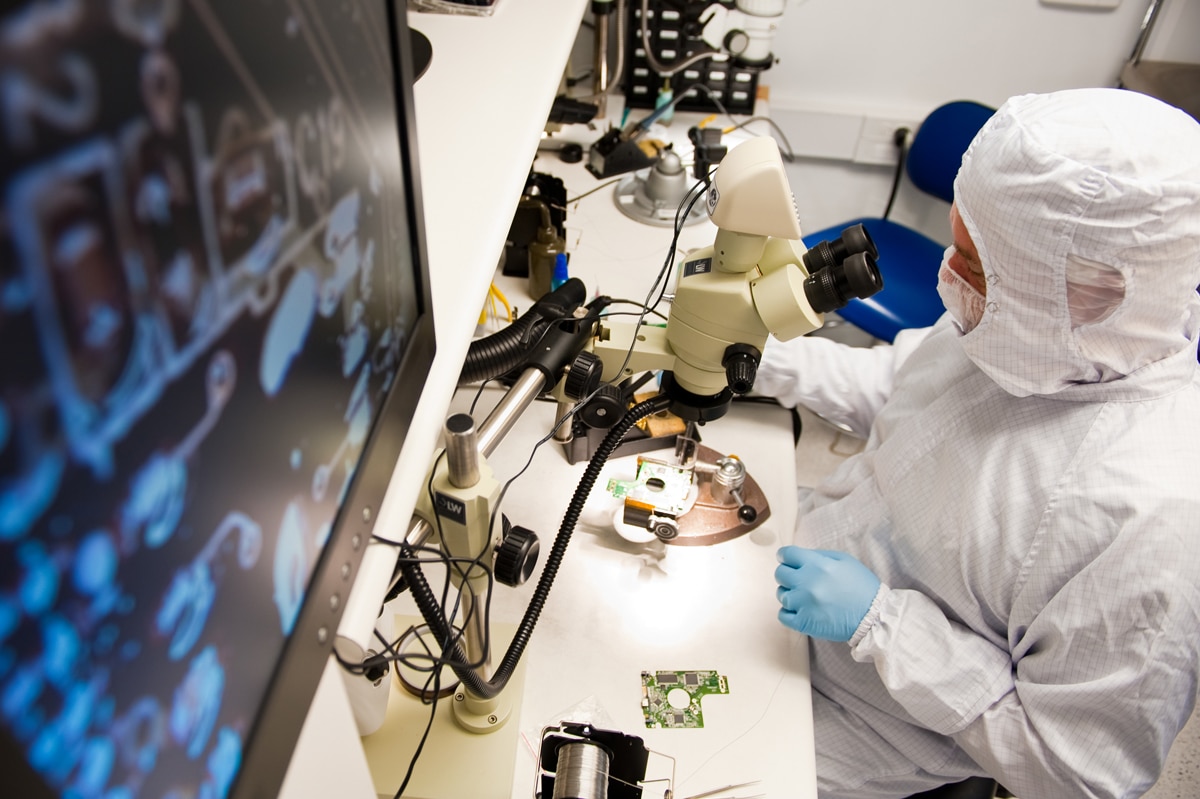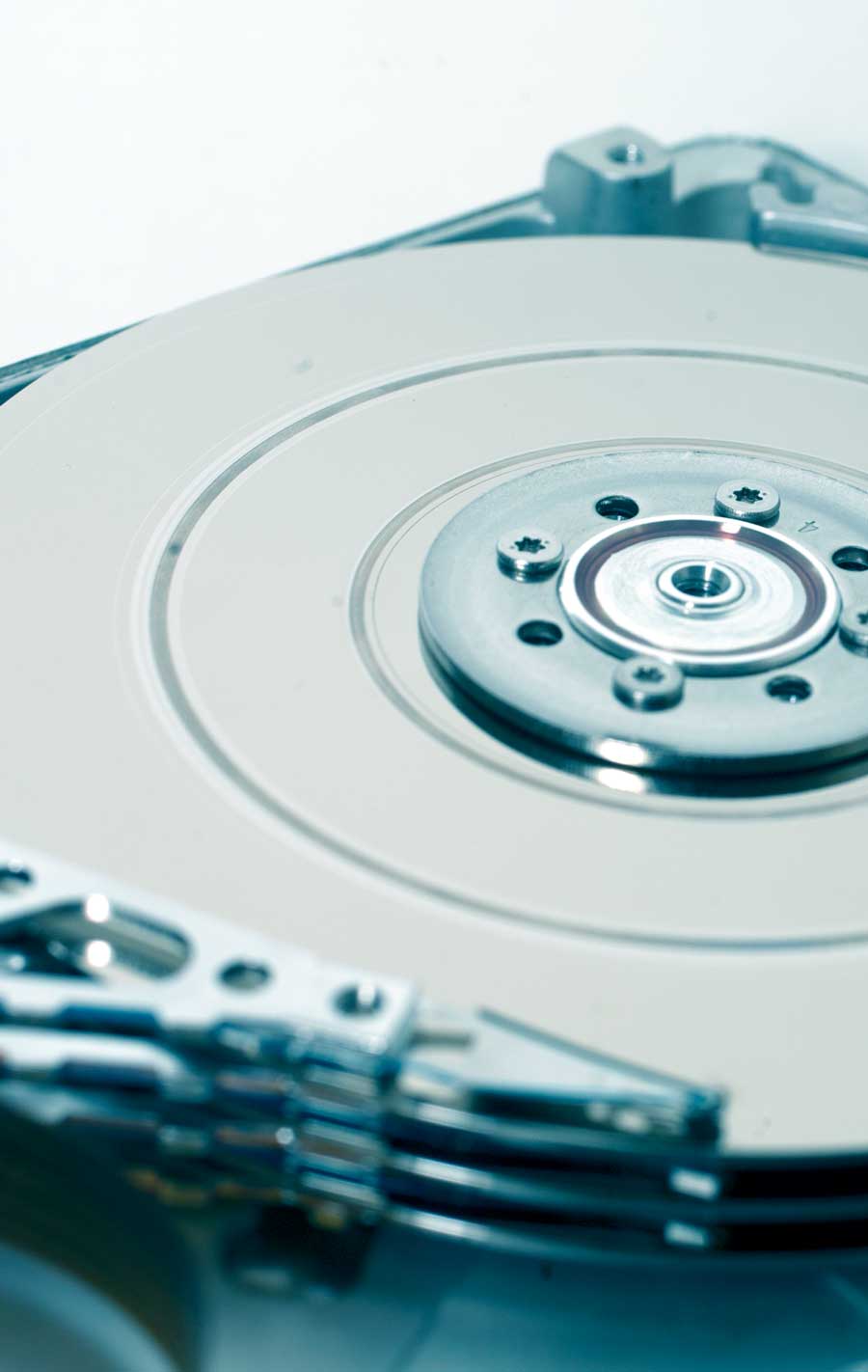Why Hundreds of Thousands of our Customers Trust DriveSavers
Mechanical Failure of Hard Drives
If you’ve experienced mechanical failure of your hard drive, you are not alone. Even though technology has progressed significantly over the years, mechanical failure and other types of hard disk drive (HDD) failures still remain a common occurrence. In fact, some manufacturers state that around 1.5% of hard disks fail annually, with a hard disk lasting between 4–7 years on average, depending upon the specifications of the hard disk.
Why Choose DriveSavers?
DriveSavers has the highest success rate in the industry when working with data recovery issues on HDDs with mechanical failure. Data recovery engineers at DriveSavers work in a sterile cleanroom environment to minimise contamination risks. We also utilise specific proprietary tools to extract customer data from damaged HDDs and remove sensitive files successfully.
- Over 40 years of experience: We’ve helped hundreds of thousands of customers who have lost data.
- Certified ISO 5 Cleanroom: DriveSavers invested over $2 million to build the world’s most advanced cleanroom, which meets manufacturer standards. This dust and static free environment helps us maintain the highest success rate in the industry.
- Manufacturer Approved: We’re recommended and authorised by the world’s leading storage and computer manufacturers. Our work will never compromise your warranty coverage. Only DriveSavers can make this guarantee.
- Exceptional Customer Service: Every DriveSavers employee is dedicated to the complete satisfaction of our customers. Call us day or night and experience our exemplary service and superior expertise.
How Experts Recover Data From Hard Drives with Mechanical Failure
If your hard drive is damaged for any reason, you should not attempt to recover data on your own or try to fix the problem yourself. Attempting a DIY solution often leads to extensive damage on the HDD, which can make future data recovery attempts impossible.
Your hard drive is a very sensitive component of your computer. It has many delicate parts that need careful attention and handling. Any sudden movement could shift parts within the HDD or lead to the read/write heads touching the magnetic disks. The result may be lost data.

When retrieving data from an HDD that has experienced mechanical failure, DriveSavers data recovery experts carefully inspect all possible damaged components and then either repair or replace those parts. All repairs are conducted in a Certified ISO 5 Cleanroom due to the extreme sensitivity of the hard drive heads and magnetic platters.
An ISO 5 Cleanroom is vital for protecting the magnetic disks in your HDD. Almost every particle is filtered in the lab, preventing the irreversible data loss that could be caused if even a few particles touch the surface of the magnetic disk. This is just one reason why it is so important to trust the experts.
Learn more: Hard Drive Data Recovery: Microscopic Particles Can Cause Huge Damage
After the components are repaired, data recovery experts make a clone of the HDD by transferring the raw data to a working device. The experts then decipher the cloned data into useable files that the customer can transfer to a working computer.
What Is Mechanical Failure?
Mechanical failure arises when an HDD’s movable parts stop working due to various reasons. This type of failure only occurs on HDD and does not occur on solid state drives (SSD). This is because SSDs do not have any moving parts, though there are plenty of other types of failure that do occur on an SSD.
An HDD uses a mechanical actuator arm that moves around a rotating storage disk to read and write data. Laptop drives can spin up to 7,200RPM and certain server-based drives can spin at 15,000RPM! This amount of movement causes wear and tear over time, which in turn leads to mechanical failure of your HDD.
As the movements within an HDD are quite sharp and precise, the slightest mechanical failure could lead to data loss and a need for data recovery.

BY MECHANICAL FAILURE
Common Indicators of Mechanical Failure
- Unusual sounds: When your HDD device emits strange sounds while in operation, it is clear that there is something wrong with your hard disk. Sounds include clicking, whirring, grinding, scraping and more.
- Acrid odor of burning electronics: This is a clear indicator that something is terribly wrong with your hard disk. If you come across this indicator, ensure your device is not plugged into any power source and contact DriveSavers.
- Your computer does not recognise your hard drive: If your computer cannot recognise your hard drive or the drive doesn’t mount, it’s time for a professional to take a closer look.
- Missing files: If you find your folders in your computer disappear or become corrupted, it could be a symptom of mechanical failure. When your hard drive’s heads give way, they will not be able to read or write data well, leading to corrupted files.
- Really slow operating speed: Do you find your computer extremely laggy while in operation? Is your computer excessively slow? This is an indicator of damage to either the spindle or your hard drive’s heads.
Indicators of mechanical failure of hard drives can differ based on the degree of problems the components of an HDD faces. If the read and write heads of an HDD are not aligned properly, this could lead to certain files not being recognised by the drive. In many instances, a full read or write crash could lead to permanent data loss if the read/write heads come in contact with the magnetic disks where the data is stored.
If you find that your hard drive has mechanical failure, you should choose a reputable data recovery company like DriveSavers, whose combined years of experience can handle all instances of HDD mechanical failures. Whether you are a business or an end user, not everyone backs up data regularly. You may have a lot of sensitive data that you need to have retrieved. To prevent permanent data loss, you should call DriveSavers right away to ensure swift data recovery.
Why Does Mechanical Failure Occur?
There are many reasons that lead to HDD mechanical failure.
- Overheating: One common cause is overheating. This is because excessive heat causes the mechanical actuator arm of the HDD to get damaged with increased wear and tear.
- Environmental factors: Your computer’s operating environment directly affects your HDD’s functioning capability. Inadequate ventilation can lead to permanent controller board damage.
- Excessive vibrations: Increased vibrations also lead to mechanical failure, especially when the write/read head tracking is affected. Any abrupt vibrations can disturb the positions of the read/write heads, causing possible data loss that requires data recovery. This especially occurs when the parts are not securely fastened to the computer’s chassis.
- Sudden electrical shocks: Unexpected electrical shocks can also lead to HDD failure. Power failures, irregular power supply and electrical power bursts can damage your hard drive.
Not every hard drive will display signs of wear before mechanical failure occurs. To prevent loss of data, you should always regularly back up your files. Keep in mind that many non-mechanical failures also display the same symptoms as mechanical failure. Some of the common non-mechanical failures include:
- Damage due to viruses
- Deletion of data accidentally or human error
- Formatting problems
- Power failure
- Corrupted files
As most HDDs last for an average of 4–7 years, it is normal for gradual wear and tear to lead to damage and mechanical failure. Just like any electronic device, your computer is made of various components that get worn out over time. These parts, as time passes, will be unable to handle the workload expected of your hard drive or they will have to work harder to process information. As a result, more stress will be placed on the already worn-out parts. Even though hard drives can handle many terabytes of data, HDDs all work mechanically and the mechanical parts of your hard drive will eventually give way over time.
Other factors such as constant power issues, manufacturing flaws and heavy computer usage can lead to mechanical failure.
What to Do If Your Hard Disk Faces Mechanical Failure
If you feel that your hard disk is damaged or is displaying any of the symptoms mentioned earlier, power off your computer right away and call DriveSavers. Note any indicators that signaled hard drive failure and relay them to the DriveSavers data recovery advisor that answers your call.
Our team of experts will quickly be able to diagnose the reasons behind your hard drive failure and be able to offer a cost estimate as well as the turnaround time for data recovery. Do not attempt to retrieve data or attempt a drive recovery yourself as this can lead to further media damage and permanent data loss.
All Operating Systems | All Storage Media
DriveSavers works closely with all storage device manufacturers and leading computer vendors to help guarantee your original equipment’s warranty is never compromised.
Contact Us 24/7 for a Free Estimate
TOLL FREE
(800) 440-1904
SKYPE
drivesaversinc

Call DriveSavers Day or Night
Call now to receive a quote and a clear recovery plan. Same-day assessment is available. Cost is confirmed before the work begins.






